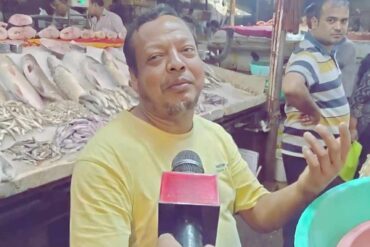Delhi’s Chittaranjan Park (CR Park), often referred to as “Mini Kolkata,” has recently become the epicenter of a contentious debate intertwining cultural traditions, religious sentiments, and political ideologies.
A video that surfaced online depicts individuals, allegedly linked to a Hindu right-wing group, urging fish vendors to close their shops due to their proximity to a local temple.
What adds a striking twist to the controversy is the claim made by local fish vendors themselves — that the very temple being cited as the reason for the shutdown was actually built with their contributions.
According to several shopkeepers and community leaders, the vendors had collectively pooled money to construct the temple years ago, seeing it as a symbol of faith and unity within the market.
This revelation not only challenges the narrative pushed by the Hindu outfit but also raises questions about the selective enforcement of religious sentiments and the erasure of the community’s historic role in shaping the cultural fabric of CR Park.
CR Park fish vendors were left stunned and confused
“We told them the land was approved by the DDA for us to set up our shops. No one has ever asked us to shut down before,” PTI quoted Divendu as saying. “We are Bengali Sanatanis. We also pray before opening our shops each day – this is our tradition.”
Mithoon Das, another shopkeeper, said he has been selling fish in the area for 25 years and what happened that day was never seen before.
“Around four or five days ago, a few people came and told us that we had to shut down our shops because we cannot sell fish near a temple,” Das said.
Ashok Bose, the vice-chairman of the EPDP (East Pakistan Displaced Persons Colony), an apex body of the Bengali community in CR Park, said the group became aware of the issue through social media.
He stated that the fish market association has already lodged a formal grievance with the EPDP, and its secretary, Ashok Bhattacharjee, is preparing to file an official police complaint regarding the incident. file a police complaint.
“The fish market was here even before the temple was built. In fact, shopkeepers pooled money to build the temple,” PTI quoted Ashok Bose.
Bose said that across India, temples are commonly located near markets or even within police stations so people can offer prayers before starting their day. “No one has had any issue with the temple being next to a fish market until now,” he added.
The video, which gained widespread attention after being shared by Trinamool Congress (TMC) MP Mahua Moitra, shows a man in saffron attire asserting that operating a fish market adjacent to a temple is inappropriate.
Moitra captioned the video: “Please watch as saffron brigade BJP goons threaten fish-eating Bengalis of Chittaranjan Park, Delhi. Never in 60 years has this happened, residents say.”
In response, Delhi BJP President Virendra Sachdeva refuted the allegations, accusing Moitra of attempting to disrupt communal harmony by sharing a “doctored” video. He emphasized that fish markets in CR Park have been legally allotted and that traders have always respected the sanctity of temples.
Historical Context and Vendor Reactions
Established to accommodate refugees from East Pakistan, CR Park has been a stronghold of Bengali culture in Delhi. The local fish market, integral to the community’s culinary traditions, has coexisted with the adjacent temple for decades. Vendors expressed disbelief over the recent demands, highlighting their contributions to the temple’s construction.
Cultural Significance and Community Perspectives
The intertwining of the fish market and the temple reflects the unique cultural fabric of the Bengali community. Fish holds auspicious significance in Bengali traditions, often being offered during religious ceremonies and served at significant events like weddings.
Sanjeev Bhattacharya, a priest at the Kali Temple near the market, emphasized that fish is considered auspicious in Bengali traditions and is offered to the goddess during Durga Puja. He also pointed out that other establishments, such as liquor shops and hookah parlors, operate near the temple without objections.
Political Repercussions and Broader Implications
This incident has ignited a political firestorm, with the BJP and TMC trading barbs. Moitra’s allegations have been met with strong rebuttals from BJP leaders, who accuse her of attempting to sow discord. The Delhi Police has initiated an inquiry into the matter, though they have not received any formal complaints.
This episode underscores a broader pattern of cultural and religious assertions by right-wing groups in India. The targeting of dietary habits and market practices reflects an attempt to impose a homogenized cultural narrative, often at odds with the pluralistic fabric of Indian society. The CR Park controversy serves as a microcosm of these tensions, highlighting the delicate balance between tradition, modernity, and political ideologies.
As Delhi grapples with these challenges, the resilience of communities like those in CR Park becomes emblematic of the broader struggle to maintain India’s rich tapestry of cultures and traditions amidst rising ideological assertions.
Last month, Delhi minister Parvesh Verma informed the Assembly that directives had been issued to crack down on unauthorized meat and fish-selling establishments across the capital.



